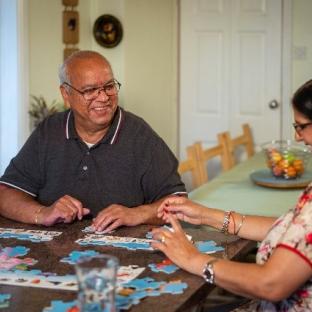In a systematic review article for the Cochrane library, a group of researchers led by Prof. Bob Woods at Bangor University have identified that cognitive stimulation programmes may have small, short-term cognitive benefits for people with mild-to-moderate dementia. Cognitive stimulation is a form of mental exercise that involves activities to stimulate thinking and memory, often delivered via group sessions.
In their systematic review, Prof. Woods and colleagues surveyed the evidence from research studies looking at the efficacy of cognitive stimulation (CS) for people with dementia and their carers. In total, they found 37 studies involving 2766 participants with mild or moderate dementia, with an average age of 79 years. Most studies lasted around 10 weeks, with an average number of 20 CS sessions. Overall, no negative results were reported from any studies. Participation in regular CS activities had a small beneficial effect on people with mild to moderate dementia.
In 25 studies (corresponding to 1893 participants) which reported results of mini-mental state examination (MMSE) tests, an average difference of 1.99 points was found between people who took part in regular CS sessions, compared to those who did not. Studies also reported some improvements in communication, social interaction, mood and behaviour. However, overall participation in CS did not make much difference to carer’s mood or anxiety levels. The authors also found evidence suggesting that cognitive benefits for people with dementia were greatest when group sessions occurred twice weekly or more, and when they were at the milder stages of dementia. Read a summary of the review, here: https://www.cochranelibrary.com/cdsr/doi/10.1002/14651858.CD005562.pub3/abstract
